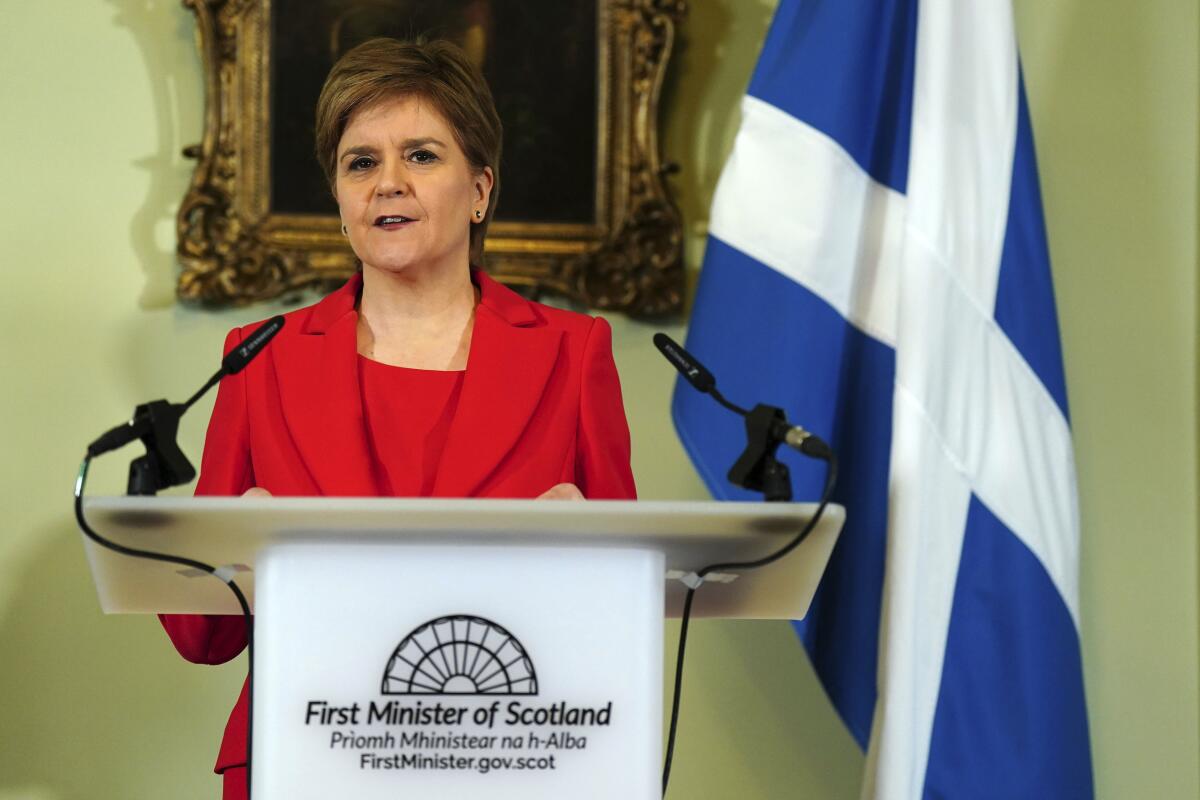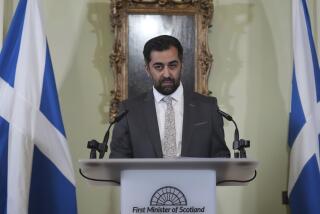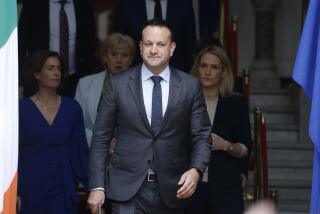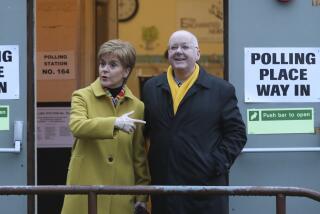Scotland leader Nicola Sturgeon, outspoken advocate of Scottish independence, resigns

LONDON — Scottish leader Nicola Sturgeon, the face of her country’s independence movement for the last eight years, announced Wednesday her intention to resign amid criticism of her drive to make it easier for people to legally change genders.
Sturgeon made the surprise announcement during a news conference at her official residence in Edinburgh, saying that part of serving well is knowing when to make way for someone else.
“In my head and in my heart I know that time is now,” she told reporters. “That it’s right for me, for my party and my country.”
Sturgeon, 52, has led Scotland since 2014, when Scots narrowly voted to remain part of the United Kingdom. While the referendum was billed as a once-in-a-generation plebiscite on independence, Sturgeon and her Scottish National Party, or SNP, have pushed for a new vote, arguing that Britain’s departure from the European Union had changed the ground rules. The central government in London has refused to allow a second referendum.
The first female leader of Scotland’s government, Sturgeon said she planned to remain in office until the SNP elected a new leader. Scotland is part of the U.K., but, like Wales and Northern Ireland, it has its own semi-autonomous government with broad powers over areas such as healthcare.
Sturgeon’s announcement caught political observers by surprise amid her staunch support for both independence and legislation that would make it easier for people in Scotland to legally change genders.
Voters in Scotland decide to preserve their 300-year-old union with Britain.
“This is as sudden as Jacinda Ardern … Geez,” tweeted SNP lawmaker Angus MacNeil, referring to the unexpected resignation last month of New Zealand’s prime minister.
Sturgeon has come under pressure in recent weeks after she pushed her gender-recognition bill through the Scottish parliament over the objections of some members of her own party. That raised concerns that Sturgeon’s position on transgender rights could undermine support for Scottish independence, the SNP’s overarching goal.
Joanna Cherry, an SNP member of the Scottish legislature, said the resignation provided an opportunity for the party.
“We must restore the SNP’s tradition of internal party democracy, open respectful debate and intellectual rigour and we must also put the welfare of everyone living in Scotland back at the heart of our endeavours,” Cherry said on Twitter.
‘Harry Potter’ author J.K. Rowling is speaking out in a new podcast, ‘The Witch Trials of J.K. Rowling,’ saying she ‘never set out to upset anyone.’
Sturgeon said she had been “wrestling” with whether it was time step down for a number of weeks. She said she wasn’t resigning because of recent criticism, though she acknowledged that the “physical and mental impact” of the job had taken its toll.
Sturgeon led Scotland through the COVID-19 pandemic and guided her party through three U.K.-wide elections and two Scottish elections.
“If the question is can I battle on for another few months, then the answer is yes, of course I can,” she said. “But if the question is can I give this job everything it demands and deserves for another year, let alone for the remainder of this parliamentary term, give it every ounce of energy that it needs in the way that I have strived to do every day for the last eight years, the answer honestly is different.”
For the last few months, much of that energy has been focused on a renewed drive for independence and the gender-recognition bill, which would allow people age 16 or older in Scotland to change the gender designations on identity documents by self-declaration, removing the need for a medical diagnosis of gender dysphoria.
News Alerts
Get breaking news, investigations, analysis and more signature journalism from the Los Angeles Times in your inbox.
You may occasionally receive promotional content from the Los Angeles Times.
Hailed as a landmark by transgender rights activists, the legislation faced opposition from some SNP members who said it ignored the need to protect single-sex spaces for women, such as domestic violence shelters and rape crisis centers.
Criticism of the bill increased after reports that a convicted rapist was being held in a women’s prison in Scotland while transitioning. The inmate was transferred to a men’s prison after being assessed by prison authorities.
While the Scottish parliament approved the legislation, it has been blocked by the central government in London because it would present problems for authorities in other parts of the U.K., where a medical diagnosis is needed before individuals can transition for legal purposes.
Sturgeon has vowed to take the British government to court, arguing that Prime Minister Rishi Sunak’s government had made a “profound mistake” by vetoing the legislation.
Some members of the SNP have criticized Sturgeon for saying she would make the next Scottish parliament election a de facto referendum on independence after the central government in London refused to sanction a new vote on dissolving Scotland’s union with the rest of the U.K. The party is set to hold a conference on the strategy next month, with some members saying it won’t work and others criticizing Sturgeon for waiting too long to press ahead.
More to Read
Sign up for Essential California
The most important California stories and recommendations in your inbox every morning.
You may occasionally receive promotional content from the Los Angeles Times.











